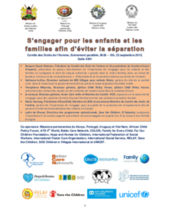This is the French version. This Human Rights Council Side event was co-sponsored by Permanent Missions of Kenya, Portugal, Uruguay and Viet Nam, African Child Policy Forum, ATD 4th World, Better Care Network, CELCIS, Family for Every Child, For Our Children Foundation, Hope and Homes for Children, International Federation of Social Workers, International Foster Care Organisation, International Social Service, RELAF, Save the Children, SOS Children’s Villages International and UNICEF. The side event was held on 22 September 2015 and was attended by over 40 participants from different Missions including USA, Canada, Sweden, Uruguay, Viet Nam, Ireland, Portugal and Panama as well as others.
The side event included presentations on family separation in the African, Asian, European, and Latin American contexts. The discussion on separation in the African context highlighted the role and importance of civil society in Africa in the following areas: preventing family separation, providing family and parenting support, deinstitutionalization and alternative care, and participation. The presentation on the promotion and support of foster care as part of family based solutions in Asia included an overview of country examples of the situation of foster care in the region, the benefits of establishing foster care systems in Asia and the remaining challenges in the implementation of such systems, as well as the next steps.
The presentation on the European context focused on deinstitutionalization of children and the need to reform welfare and protection systems and invest in community-based alternatives. It also included a review of the work of Opening Doors for Europe’s Children to deinstitutionalize children and reintegrate them into families. Finally, the discussion on children’s separation from their families in the Latin American context highlighted the issue of migration, particularly the unaccompanied migration of children from Central America. The presentation featured key findings on various countries and recommendations for the future.

